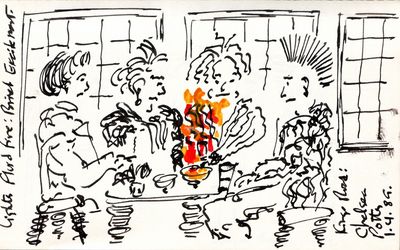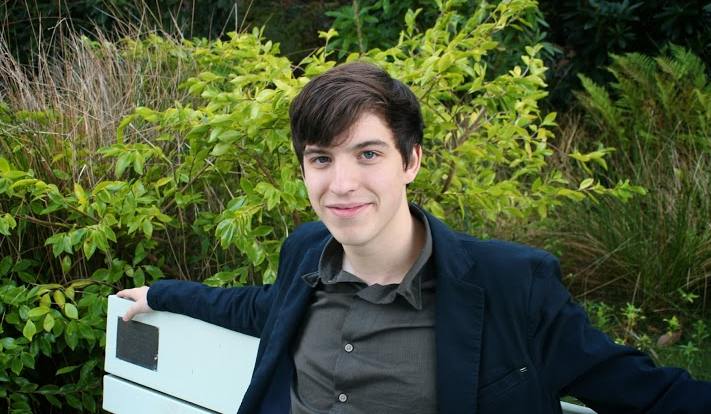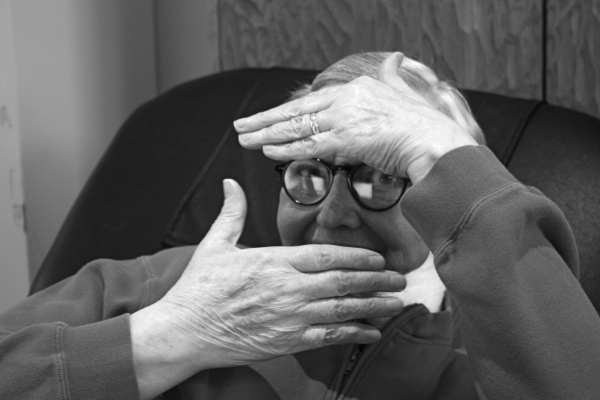Sunday night, Chaz Ebert saw the new documentary “Life Itself” with a large audience at the film’s world premiere at the Sundance Film Festival. She had chosen not to screen the film before last night, and it was an emotional experience. She sat down Monday morning to talk about the experience, about the things she learned from watching the film and about the many facets of Roger.
Sam Fragoso: Last night was very emotional for me and for many in the audience. What was the experience like for you last night?
Chaz Ebert: Well, it was a beautifully emotional event in the sense that, sitting there with the audience, I felt enveloped by their love—or if “love” is too strong of a word, I felt enveloped by their compassion. It felt as if we were breathing with one breath.
There were times when the film was a little difficult for me to watch, like when my granddaughter was talking about what things her grandfather taught her about movies and books and life itself. And she broke down a little bit, because Roger was a loving kind grandfather, and he loved his grandchildren so much.
You know, we used to take a holiday, when the TV show would go on hiaitus, we would take them away for a month. So we had a lot of time with them to play. People didn’t know as much about Roger the family man. And so that was beautiful to see on screen. But also difficult, because his grandchildren don’t have him now.
That was a side of Roger most people didn’t know. They knew him as a film critic and a TV personality. One of the things I wrote down at the screening was ‘there is a sense of unity that I have not felt at the festival.’ I talked to so many people at the screening who were touched by him and felt close to him.
What about Roger did that?
You know, that’s the sixty-four thousand dollar question, or the million dollar question these days. I am amazed at the number of people who come up to me and every single one of them has a personal Roger Ebert story. How could he touch that many people? I don’t know. How many Rogers were there?
Sometimes, I’d tease him and say ‘Roger, how many of you are there?’ And he’d say ‘I contain multitudes.’
Really, I think it’s because he was sincere. When he reached out to people, there were no cameras. People weren’t going to write stories about it. He did it because he really felt that way and he really liked communicating with other people and reaching out to them. He liked mentoring, and so he would answer letters and take time to talk to people who sincerely wanted to learn about journalism.
And he also sincerely was curious about what it was like to be another person. He liked getting inside the head of another person and inside the heart of another person. He said we are constrained in this box of life, but to get to know what it feels like to be a person of another age or race or gender is just a gift. If you’re curious and just reach out, you’ll find out.
So I think that that was his secret: he really was curious and he really wanted to know
When the film ended and you were on stage for the Q&A, you said “My mind is in a brain freeze. I felt exactly the same, really paralyzed. I loved the movie, but it’s hard to detach yourself. I think Steve James did a good job of not canonizing Roger as a saint.”
There were things in there, about his drinking days and closing bars down. And he was a man, he was a real live breathing human being and he lived a full rich life.
The film really suggests that you were a change point in his life.
That’s what people say. I don’t know. The one thing early on that I did not know, that I learned in the movie for the first time…
Oh, so you learned new things when seeing the film?
That material about him writing about the bombing in Birmingham and those four little girls [when Roger was the editor of his college newspaper, he wrote an editorial about the church bombing in Birmingham.–Ed.] That was so beautiful and so profound, and he was a college student, and he didn’t wait for someone to give him permission to assert his moral authority. He took charge of that.
He had an inner moral code of what was right and what was wrong. When he talked [in that editorial] about how the blood was not just on their hands, it was on all of our hands, that was so powerful to me. Where did that come from? That’s why I loved him so much, because it was not something he developed later in life. He had it in him.
I don’t know how one does that at 21.
And when he was faced with the Kennedy assassination and wanting to stop the presses because an [advertisement in the college newspaper] looked like it had a sword pointed at the photo of Kennedy: how many people would do that, say ‘No, we can’t run that. Stop the presses,’ when you’re that young?
I mean, I just admired and loved him so much, and the movie just showed me more things to admire about him. Roger would say, ‘Chaz, sometimes I think you put me on a pedestal.’ Well, you know what? This documentary didn’t wobble that pedestal at all for me. It only secured it.
What were the moments that were harder for you? One for me is when Roger wants to go up the stairs, and he wants to do it himself. And you’re frustrated and understandably so.

I did ask Steve, is that part in the movie? He said yes it is and I thought ‘Oh, my God, I probably look like a witch.’ But you know what? I wanted a warts-and-all portrait for both of us, not just for him.
You told a story about when you needed surgery and his proudly wheeling you into the hospital even though he was ill, as if to say, “I’m her man, I’m supporting her.”
Yes, it was a two-way street, and I wanted to do everything I could to help him continue to be the person he was, that I knew he was inside. And I knew that his appearance was altered, that it would be difficult for some people to take, but I knew inside he was still the same Roger, and I wanted him to be able to express that, even though he didn’t have the physical voice. To go to the lengths to help him do that caused my heart to grow. It helped me to develop such a deep compassion, not for just him and what we were going through, but for other people. And I tell you, it helped strengthen me as a person.
So he gave to me as much as or more than I gave to him. So to me, when people say ‘Oh, she’s such a saint,’ it’s not that.
He just never seemed scared. And I know that can’t be the case. In the film, there’s an excerpt from a television interview from earlier in his illness, and you’re thinking about another surgery, and you start to break down a bit, and he’s holding your hand.
But how was he not terrified? Was he ever?
Only after the last surgery, when he decided that they had taken more and more away from him. That’s when he decided, no more surgeries. He said the fact that I can still walk, think, type, go to movies, travel, be with my family, go to the opera, go to plays…He said, “I I have another surgery, it’s not that they’ll kill me—they might—it’s that they might take away my ability to do all of these things if it’s not successful. So, right now we have a good life, so let’s leave it there.”
So it wasn’t fear, it was more of a pragmatic reality, that, “Hey, maybe this is just the hand that life dealt me.”
When he got sick, on his blog, he started talking about everything under the sun. It seemed different than what he’d done before, or at least different from what was widely read.
He actually did write about those things before, but because the blog was so widely disseminated, [more people saw them]. There are other writings that I want to collect and publish to show that he always wrote about other topics. He was always curious, and he never wanted to be just relegated to film. He wrote about politics because he cared deeply about politics. There were some things he would maybe send to a magazine or maybe publish in the Sun-Times, but not so widely disseminated because people knew him for film.
I remember searching through YouTube to watch all of the videos of Roger on Johnny Carson and David Letterman’s talk shows. And he was on Bill O’Reilly once. He was so versatile.
He was brilliant, and some people just didn’t know how brilliant he was. I think there are still some things that we’ll put together from archives. There are so many facets of Roger that people still haven’t plumbed. All of his sketches and things from his travels and so much that he did and he was. And he could talk to anyone about any topic, any time.

He was so prolific. Was it ever a hindrance, an obstacle to your life together with him writing so much?
No. I’ll tell you, it’s like the question I posed: how many Rogers are there? How was he so prolific and still reach out to so many people. I’m telling you, I’ve heard that from hundreds of people.
And we still had a life, we’d still go out to theater, and we’d still travel and go to London or Venice, to the English countryside and walk around. Or we’d have our date nights, and go to the opera. He did all this, and on top of that he was always really deep into reading some book. It was, ‘Oh I think I’ll read all of Trollope again,’ and he loved Shakespeare. When I say he was extraordinary, that is almost a word that’s not big enough to encompass what he was.
Main photo by Grace Wang.












